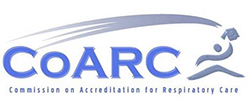Respiratory Therapist School & Degree Programs
NOTICE: for students currently taking prereqs, your requirements for entering the respiratory therapy program are changing beginning fall 2024:
- Students currently taking prereqs under High School Option 1 for program admission, you no longer need to take Medical Terminology (HLTH 1215) prior to program admission beginning fall 2024.
- Students currently taking program admission prereqs under College Option 2, MATH 1330 Statistics for Health Sciences (or equivalent) is replacing Medical Terminology (HLTH 1215) for program admission. BIOL 2210 Anatomy and Physiology 1 is still required.
- Starting fall 2024, Physics for Allied Health (PHYS 1440) will be removed from the curriculum. Students entering the program in fall 2024 will not be required to take the course.
Respiratory therapy involves preventive, diagnostic, rehabilitative and intensive-care therapy for patients cardiopulmonary problems.
Respiratory therapy, as a clinical discipline, has grown rapidly and is essential to health care. Technological advancements and increased longevity combined with harmful effects caused by air pollution and hazardous occupations have created an increased demand for respiratory therapists.
Lakeland's Respiratory Therapy degree program provides a sound preparation for the registry examination and employment. Students in the program will have a wide variety of clinical experiences in several affiliated hospitals, long-term care facilities and other community-based respiratory care providers.
To become a licensed respiratory therapist in Ohio, you must obtain at least an associate degree, as if offered through our program here at Lakeland.
Students must be admitted to the respiratory therapy program to enroll in RESP courses. Other courses may be taken prior to admission to the program.
A minimum GPA of 2.0 and a "C" grade or higher are required in all respiratory therapy and general education courses as listed in the curriculum guide for the Associate of Applied Science degree in respiratory therapy.
Respiratory therapists are trained to work therapeautically with people who have heart and lung disorders. As a respiratory therapist you will:
- Initiate and manage life support equipment and artificial airways
- Administer and manage aerorolized medications and gases
- Provide a variety of therapies to people of all ages
- Draw and analyze blood samples
- Assist in diagnosing lung and breathing disorders
- Respond to heart attacks and breathing emergency situations
When you successfully complete the program, you can sit for the Registered Respiratory Therapist (RRT) exam which is a nationally-recognized credential signifying excellence in the field.
The RRT credential must be submitted as part of the application for licensure to work as a respiratory therapist in the state of Ohio.
All students enrolled in a nursing or allied health program/certificate must complete a criminal background check. In accordance with clinical site requirements, students with a criminal record may be ineligible to participate in a clinical course/rotation/practicum. Additional background screening may be required by individual facilities.
Drug testing may be requested in accordance with clinical affiliation requirements and/or for patient/student health and safety.
You can complete Lakeland's respiratory therapy program in five semesters to earn your Associate of Applied Science in Respiratory Therapy degree.
Both fields take commitment to succeed but differ in their focus.
- As a respiratory therapist, you will focus on the heart and lungs.
- Nurses focus on the body as a whole.
Yes! Respiratory therapy is one of the health care jobs that is hiring at a rate faster than the national average.
For more information on job outlook and salaries, visit the U.S. Bureau of Labor Statistics website.
Here are some of the paths Lakeland respiratory therapy students have taken:
- cardiac and pulmonary stress testing in outpatient laboratories and in-hospital laboratories
- clinical education
- home care
- intensive care: neonatal/pediatric, medical/surgical
- medical law
- medical school
- nurse anesthetist
- nurse practitioner
- organ transplant team members
- pharmaceuticals
- polysomnography (sleep study technician)
- pulmonary rehabilitation
- physician's assistant
- respiratory care in area hospitals, subacute care facilities, and long-term care facilities
- sales/marketing
- supervisory/management/administration
- transport/emergency care team members
- vascular lab technology
Fill out a FAFSA and indicate school code 006804 for Lakeland.
Once you are in the Lakeland system, you may be eligible for many scholarships and grants. Lakeland recently received a new grant to provide scholarships for specific health programs, including the respiratory therapy program. Start planning early to be able to meet the tuition deadlines for each semester. Visit Lakeland's Financial Aid department website for more information.
To prepare graduates with demonstrated competence in the cognitive (knowledge), psychomotor (skills), and affective (behavior) learning domains of respiratory care practice as performed by registered respiratory therapists (RRTs). View our list of essential skills and technical standards for students.
In June 2020 and 2021, the program was recognized by CoARC to receive the Distinguished RRT Credentialing Success Award. The CoARC board used objective criteria based on key accreditation metrics to select programs for the recognition. Among these were maintaining an RRT credentialing success of 90% or above among Lakeland's respiratory therapy graduates for the past three years.
In 2022, Lakeland's Respiratory Therapy Program was one of only 23 programs in the nation that have been recognized by the Commission on Accreditation for Respiratory Care (CoARC) to receive the President's Award for Credentialing Success. This is the highest achievable award given by the commission and is presented as part of CoARC's continued efforts to value the Registered Respiratory Therapist (RRT) credential as a standard of professional achievement.

The Associate of Applied Science degree in respiratory therapy at Lakeland Community College, Kirtland, Ohio is accredited by the Commission on Accreditation for Respiratory Care (CoARC) (Program #200242) www.coarc.com, 264 Precision Blvd., Telford, TN 37690; phone: 817.283.2835. Programmatic outcomes are available at https://coarc.com/students/programmatic-outcomes-data.
CoARC accredits respiratory therapy education programs in the United States. To achieve this end, it utilizes an ‘outcomes based' process. Programmatic outcomes are performance indicators that reflect the extent to which the educational goals of the program are achieved and by which program effectiveness is documented.
CoARC is recognized by the Council for Higher Education Accreditation (CHEA). www.chea.org
- Respiratory Therapy Program Guide
- Respiratory Therapy Current Schedule
- Health Programs Admissions Requirements
- Tuition, Fees & Expenses [.PDF]
- Respiratory Therapy Program Accreditation
- Programmatic Outcomes Data
- American Association for Respiratory Care
- National Board for Respiratory Care
- State Medical Board of Ohio Licensure
- Ohio Society for Respiratory Care
- Student Respiratory Therapy Association




